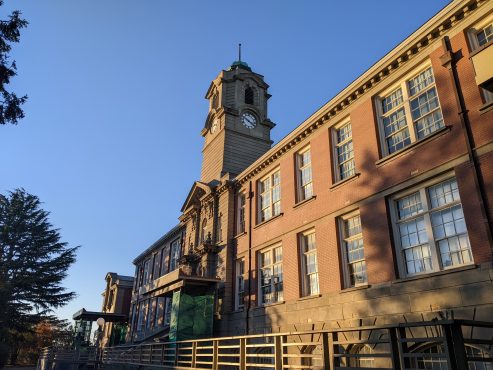UVic alumni lecture on trauma-informed storytelling and recording resistance movements

The lecture was held at Camosun College. Photo by Isabella Kennedy.
Camosun College welcomed journalist Jenessa Joy Klukas and photojournalist Mike Graeme on Oct. 26 for the guest talk “Reporting Resilience!”
The lecture, hosted by the Department of English Indigenous Working Group, was a dive into the concept of culturally-safe journalism and the responsibilities of decolonization. The evening addressed how journalists can balance integrity, objectivity, and self-care while reporting contentious or traumatic subjects. Both Graeme and Klukas contribute to IndigiNews, an independent platform that aims to tell stories from local Indigenous perspectives.
Graeme has dedicated his work as a photojournalist towards the amplification of environmental resistance movements. He initially pursued a career working in forestry, an industry he chose partially because of his love for nature.
Graeme described that while on a helicopter ride he took an aerial shot of an active Sinixt land blockade at the edges of the Kootenay river. The photographer described this as a turning point for him, as the government had falsely declared the Sinixt Nation ‘extinct’ in 1956. Another “marked moment” came when Graeme was invited to document the Rick Desautel hunting case as it reached the Supreme Court of Canada, a debate that centered on Indigenous land rights.
These were pivotal moments in Graeme’s career path, leading him to his current work. He described coming to terms with his position as a white settler, unraveling the history of colonialism that has led to his inherent privilege in the world.
Klukas and Graeme talked about the significance of self-situating as a journalist, describing it as taking responsibility for colonial histories and seeing the process of writing and documenting as reciprocal, not extractive.
Klukas expressed the need for journalists to take accountability and pinpoint the truth and spirit of people’s narratives. For Graeme, it means sometimes putting his camera down altogether, taking a step back in situations of hardship or trauma. Sometimes this means missing the image, but building a relationship.
During the lecture, it became clear that the concept of culturally-safe journalism is not always about self-preservation. Often, it is quite the opposite. After working in the child-care industry for 11 years, Klukas published her first story for the Tyee, an independent publication, in 2021. She reflected that the report, a piece on the importance of vaccinations in daycare, “put a target” on her back.
Identifying herself as Métis and Xaxli’p, Klukas said she was at first hesitant to select journalism as her career path. However she reached a turning point while taking her BFA in Creative Non-Fiction at UVic. Despite her trepidation, a professor convinced her to submit her story for publication. Through contributions outside mainstream news outlets, Klukas realized she could have a space in journalism. In 2021, Klukas began a fellowship at the Tyee.
For both Klukas and Graeme, journalism is based on building relationships with subjects, taking time to get to know them. They reminded the audience, it’s important that they are not always chasing the story. Rather, journalists should seek to be present with their subjects, attend events outside of reporting on them, and respect individual communities’ protocols.
Building a relationship with a subject could go against the long-sanctified principle of neutrality in reporting. However, turning to the audience, Klukas and Graeme asked, “what does objectivity mean in journalism?” For one audience member, it was “removing biases and opinions.” For another, “an academic myth.”
Graeme and Klukas seemed to agree with the latter, as they highlighted the work of Lewis Raven Wallace, author, host, and producer of The View from Somewhere. Wallace claims that in the media, objectivity can become a tool to perpetuate racial prejudice, historically, “complicity with white supremacy in the white press was depicted as neutral”.
Objectivity becomes an illusion for seeking truth or balance, but when used by predominantly white, heterosexual, cis-gendered media, it becomes biased from that point of view. Instead of pursuing objectivity, Klukas reminded the audience that situating yourself as a journalist makes you stronger.
These reflections come at a time when trust in media outlets is at an all-time low, with a Reuter’s study reporting that less than half of Canadians, 42 per cent, reporting that they trust “most of the news, most of the time.”
As some final words of advice, Klukas reminded the audience to be kind and be aware of the experiences you are asking a person to relive when discussing trauma. This compassion extends to the self too, as Klukas finished, “don’t be a tortured writer, be a self-care writer.”
Editor’s note, Nov. 29, 2022: the Rick Desautel hunting case was previously stated in this article as reaching the Provincial Supreme Court, which has been corrected to the Supreme Court of Canada.







